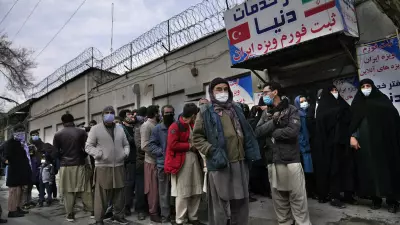Six months after the U.S. pulled out of Afghanistan and the Taliban took over, Afghans say even without war, things have gotten worse.

Faced with economic instability and starvation, people are desperate to flee. More than 76,000 Afghans have been evacuated to the U.S. since August in hastily-arranged efforts, amid panic and violence. They continue to settle in cities from U.S. military bases — many to Postindustrial regions such as Columbus, Milwaukee, Chicago, and Pittsburgh.
But many more live in increasingly desperate conditions.
“What to do with this peace now? Can we eat or drink peace? Can it help the poor people who are starving?” said Mohammad Islam, of Kabul, the country’s capital. “Of course, no one is getting killed in the suicide bombings, but people are offering to sell their starving children right now.
“When it comes to the life of ordinary Afghans … the economic situation is getting very bad day by day,” he said.
The Taliban assumed control on Aug. 15, after the U.S. started the final phase of its troop withdrawal from Afghanistan, following 20 years of the war against terrorism. Even during the U.S.-led war, thousands of people fled because of fighting and corruption.
Since the American withdrawal, there has been a visible decrease in bomb blasts, though ISIS-K has carried out a few attacks targeting the Taliban and Shia Muslims gatherings.
Islam said there is no visible bloodshed. Instead, the most concerning issues for many Afghans are joblessness, poverty, hunger, and violations of human and women’s rights.
“Now, young Afghans are trying to use any possible option to leave the country. No one feels safe to (object to the Taliban). People are afraid that if they make any complaints, the Taliban will question them,” he said.
Even without the constant threat of violence, conditions are still perilous: Human Rights Watch reports at least 72 killings since August, attributed to the Taliban.
About 15 countries have reopened embassies in Afghanistan but would not let the Taliban open Afghan embassies in their countries, which means they do not recognize the regime. Those countries mainly have said that the reason for opening their embassies in Kabul is to continue to help people.
“The war is gone now; the warlords and the militia groups which were led by the warlords are also gone, but what to do with high prices, no electricity, joblessness — and the poverty rate is high?” — Gul Mirza Habibi, a resident of eastern Laghman province
Gul Mirza Habibi, a resident of eastern Laghman province, says there have been a lot of changes — mostly negative.
“The war is gone now; the warlords and the militia groups which were led by the warlords are also gone, but what to do with high prices, no electricity, joblessness — and the poverty rate is high?” he said.
Food prices skyrocketed in the past six months and many people hardly get two to four hours of electricity in 24 hours.
Habibi said the Taliban must form a government that is accepted by Afghans and the international community, and the regime must ensure human rights.
“Right now, the Afghan nation is [being held] hostage by the Taliban,” said Samim Khyber, an Afghan political analyst at Mashal-e-Rah College in Kabul.
Habibi said the change is visible in day-to-day life.
“So why is this migration happening? It clearly means that the Taliban cannot provide people with salaries, work, and they can’t build up the economy and resources. That is why people are leaving,” Habibi said.
“I think all the other problems about human rights and women’s rights are because there was a big change in the ideology. The former government believed in democracy and the current rulers believe in Islamic-type of system,” he said.
The Taliban must come up with a positive answer to questions about safeguarding individual rights and safety — these are the questions posed by the international community, he said.
“I think the Taliban are under a huge pressure. So far, it has been a harsh winter. We’ll see if they open the schools and colleges for girls, or not, in the coming one or two months. If the Taliban wants to have good ties with the world, they must act accordingly; otherwise, their regime will collapse very soon,” he said.
Habibi said that the Taliban has changed; their rule is different than in the 1990s. This regime formed a cabinet in which almost all of the ministers are Islamic religious people, except for the Ministry of Public Health.
“They are not that strict about Sharia law this time. People feel kind of safe but it is still not completely safe, because low-level Taliban in rural Afghanistan are still carrying out revenge killings,” he added.
Meanwhile, the humanitarian crisis has worsened, with more than half the country experiencing food insecurity, according to United Nations estimates.
Numan Dost, an Afghan writer and journalist who lives in Kabul, suggested people present a cauliflower to their friends on Valentine’s Day.
“Valentine’s Day is not part of our culture … but if there are serious and emotional lovers, and if their partners do not mind, instead of a flower, give your lover a cauliflower, which looks like a flower and your lover won’t have to (buy) a lunch.”







